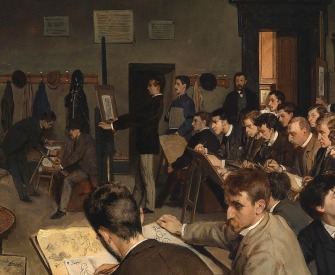During the first years of my service in Dr. Flint’s family, I was accustomed to share some indulgences with the children of my mistress.
Though this seemed to me no more than right, I was grateful for it and tried to merit the kindness by the faithful discharge of my duties. But I now entered on my fifteenth year, a sad epoch in the life of a slave girl. My master began to whisper foul words in my ear. Young as I was, I could not remain ignorant of their import. I tried to treat them with indifference or contempt. The master’s age, my extreme youth, and the fear that his conduct would be reported to my grandmother, made him bear this treatment for many months. He was a crafty man and resorted to many means to accomplish his purposes. Sometimes he had stormy, terrific ways, that made his victims tremble; sometimes he assumed a gentleness that he thought must surely subdue. Of the two, I preferred his stormy moods, although they left me trembling. He tried his utmost to corrupt the pure principles my grandmother had instilled. He peopled my young mind with unclean images, such as only a vile monster could think of. I turned from him with disgust and hatred. But he was my master. I was compelled to live under the same roof with him, where I saw a man forty years my senior daily violating the most sacred commandments of nature. He told me I was his property, that I must be subject to his will in all things. My soul revolted against the mean tyranny. But where could I turn for protection? No matter whether the slave girl be as black as ebony or as fair as her mistress. In either case there is no shadow of law to protect her from insult, from violence, or even from death; all these are inflicted by fiends who bear the shape of men. The mistress, who ought to protect the helpless victim, has no other feelings toward her but those of jealousy and rage. The degradation, the wrongs, the vices, that grow out of slavery, are more than I can describe. They are greater than you would willingly believe. Surely, if you credited one half the truths that are told you concerning the helpless millions suffering in this cruel bondage, you in the North would not help to tighten the yoke. You surely would refuse to do for the master, on your own soil, the mean and cruel work which trained bloodhounds and the lowest class of whites do for him at the South.
Everywhere the years bring to all enough of sin and sorrow, but in slavery the very dawn of life is darkened by these shadows. Even the little child, who is accustomed to wait on her mistress and her children, will learn, before she is twelve years old, why it is that her mistress hates such and such a one among the slaves. Perhaps the child’s own mother is among those hated ones. She listens to violent outbreaks of jealous passion and cannot help understanding what is the cause. She will become prematurely knowing in evil things. Soon she will learn to tremble when she hears her master’s footfall. She will be compelled to realize that she is no longer a child. If God has bestowed beauty upon her, it will prove her greatest curse. That which commands admiration in the white woman only hastens the degradation of the female slave. I know that some are too much brutalized by slavery to feel the humiliation of their position, but many slaves feel it most acutely and shrink from the memory of it. I cannot tell how much I suffered in the presence of these wrongs, nor how I am still pained by the retrospect. My master met me at every turn, reminding me that I belonged to him, and swearing by heaven and earth that he would compel me to submit to him. If I went out for a breath of fresh air after a day of unwearied toil, his footsteps dogged me. If I knelt by my mother’s grave, his dark shadow fell on me even there. The light heart which nature had given me became heavy with sad forebodings. The other slaves in my master’s house noticed the change. Many of them pitied me; but none dared to ask the cause. They had no need to inquire. They knew too well the guilty practices under that roof, and they were aware that to speak of them was an offense that never went unpunished. I longed for someone to confide in. I would have given the world to have laid my head on my grandmother’s faithful bosom and told her all my troubles. But Dr. Flint swore he would kill me if I was not as silent as the grave. Then, although my grandmother was all in all to me, I feared her as well as loved her. I had been accustomed to look up to her with a respect bordering upon awe. I was very young and felt shamefaced about telling her such impure things, especially as I knew her to be very strict on such subjects. Moreover, she was a woman of a high spirit. She was usually very quiet in her demeanor, but if her indignation was once roused, it was not very easily quelled. I had been told that she once chased a white gentleman with a loaded pistol because he insulted one of her daughters. I dreaded the consequences of a violent outbreak, and both pride and fear kept me silent. But though I did not confide in my grandmother, and even evaded her vigilant watchfulness and inquiry, her presence in the neighborhood was some protection to me. Though she had been a slave, Dr. Flint was afraid of her. He dreaded her scorching rebukes. Moreover, she was known and patronized by many people, and he did not wish to have his villainy made public. It was lucky for me that I did not live on a distant plantation but in a town not so large that the inhabitants were ignorant of each other’s affairs. Bad as are the laws and customs in a slaveholding community, the doctor, as a professional man, deemed it prudent to keep up some outward show of decency.
Oh, what days and nights of fear and sorrow that man caused me! Reader, it is not to awaken sympathy for myself that I am telling you truthfully what I suffered in slavery. I do it to kindle a flame of compassion in your hearts for my sisters who are still in bondage, suffering as I once suffered.
From Incidents in the Life of a Slave Girl. For refusing her enslaver’s sexual advances, Jacobs in 1835 was sent from his house to his plantation. She soon ran away, finding refuge in the attic of her free grandmother, where she remained for seven years. Reaching the North in 1842, Jacobs eventually found work in the antislavery reading room above Frederick Douglass’ newspaper, The North Star, in Rochester, New York.
Back to Issue





